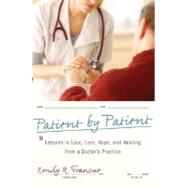
Emily R. Transue, MD, author of On Call, is a native of Toledo, Ohio, and a graduate of Yale College and Dartmouth Medical School. She did her residency and chief residency in Internal Medicine at the University of Washington, Seattle. She works as a general internist at a multispecialty group in Seattle, and is a clinical Assistant Professor at the University of Washington. She received the Providence-Seattle Medical Center Outstanding Educator of the Year award in 2003, and is a Fellow of the American College of Physicians. She has also published stories and poems in JAMA, Dartmouth Medicine, and elsewhere.
| Beginnings | |
| Another Beginning | p. 3 |
| First Days | p. 6 |
| Coding and Compliance | p. 10 |
| Advice | p. 16 |
| Hematospermia | p. 19 |
| Family History | |
| Living Long Enough | p. 25 |
| Loss | p. 35 |
| Godiva Diabetic | p. 44 |
| Lost and Found | p. 49 |
| Family | p. 61 |
| Laughter and Loss | |
| The Peggy Afternoon | p. 77 |
| Margaret | p. 82 |
| Afternoon Off | p. 91 |
| California Poppies and Bleeding Hearts | p. 94 |
| Being Doctor Transue | p. 103 |
| Musings on Death from a Day in January | p. 109 |
| Interruptions | p. 116 |
| Valley of the Shadow | p. 124 |
| The Medical History of Julia Evelyn (Wilson) Hanson | p. 129 |
| Dolly Parton | p. 132 |
| Words | |
| Normal | p. 137 |
| Lucky | p. 140 |
| Grief | p. 156 |
| Words | p. 162 |
| A Doctor or an Architect | p. 169 |
| Self-Consciousness | p. 172 |
| Time | p. 174 |
| One-Liners | p. 180 |
| Endings and Beginnings | |
| Letting Go | p. 189 |
| Simple | p. 199 |
| October | p. 200 |
| Pills | p. 220 |
| Embodiment | p. 223 |
| On the Airplane | p. 228 |
| A Reading | p. 234 |
| Lonely | p. 236 |
| Margaret, Part Two | p. 242 |
| Bridge | p. 249 |
| January | p. 252 |
| Epilogue: Kaleidocycles | p. 256 |
| Table of Contents provided by Blackwell. All Rights Reserved. |
The New copy of this book will include any supplemental materials advertised. Please check the title of the book to determine if it should include any access cards, study guides, lab manuals, CDs, etc.
The Used, Rental and eBook copies of this book are not guaranteed to include any supplemental materials. Typically, only the book itself is included. This is true even if the title states it includes any access cards, study guides, lab manuals, CDs, etc.
Excerpted from Patient by Patient: Lessons in Love, Loss, Hope, and Healing from a Doctor's Practice by Emily R. Transue
All rights reserved by the original copyright owners. Excerpts are provided for display purposes only and may not be reproduced, reprinted or distributed without the written permission of the publisher.